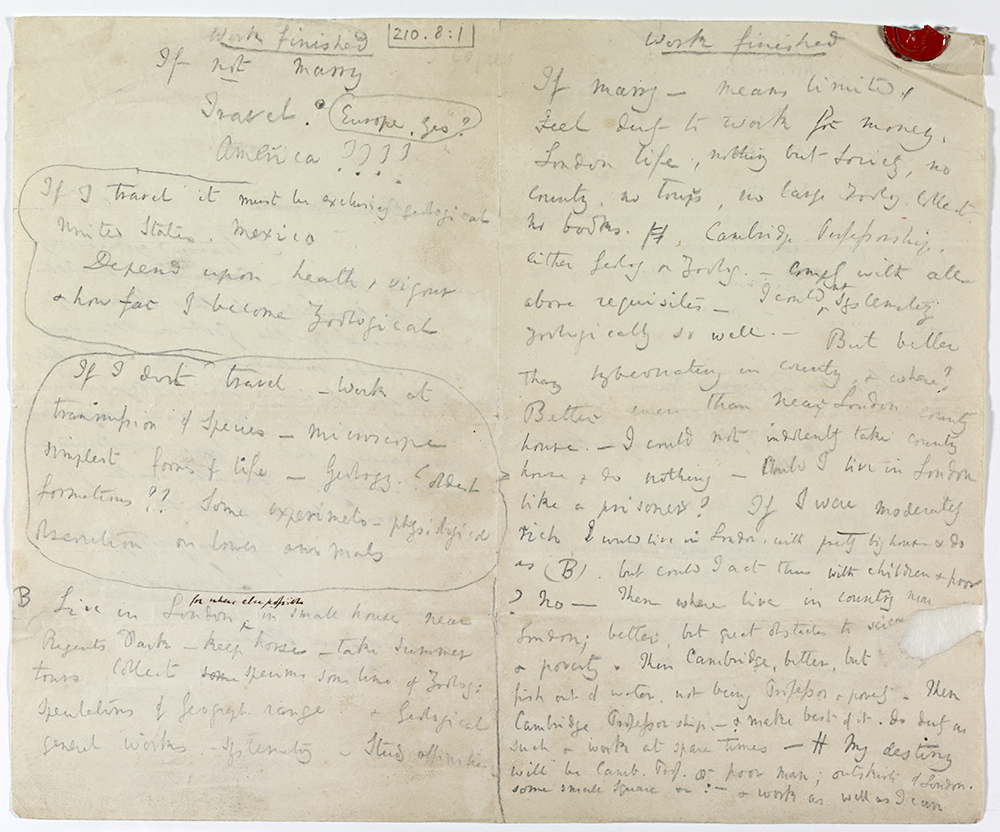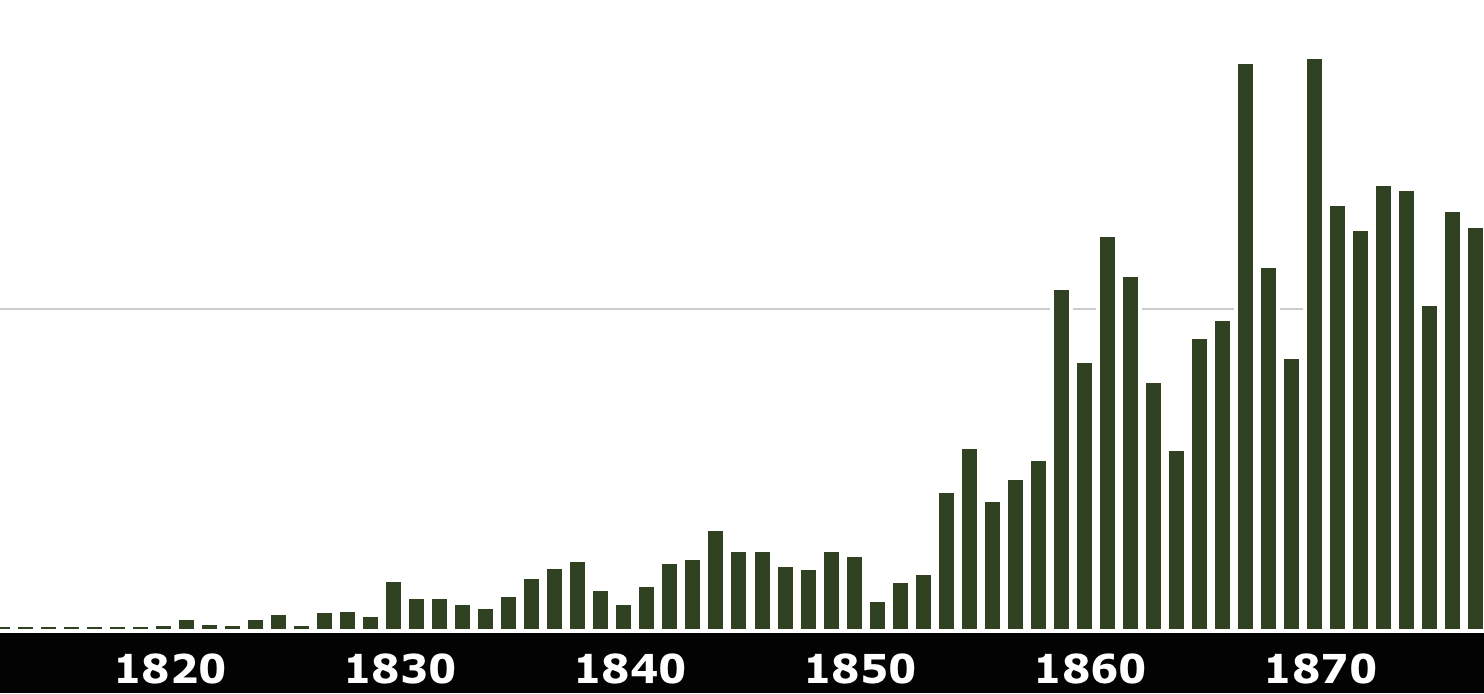On 11 November 1838 Darwin wrote in his journal 'The day of days!'. He had proposed to his cousin, Emma Wedgwood, and been accepted; they were married on 29 January 1839. Darwin appears to have written these two notes weighing up the pros and cons of marriage in the months immediately preceding his engagement. The original manuscripts are in the Darwin Archive in Cambridge University Library.
The related letters contain a selection of musings on marriage by Darwin and his correspondents.
First note [after 7 April 1838][1]
Work finished[2]
If not marry | Travel. Europe, yes?[3] | America????
If I travel it must be exclusively geological United States, Mexico Depend upon health & vigour & how far I become Zoological[4]
If I dont travel.- Work at transmission of Species- Microscope simplest forms of life- Geology. ?.oldest formations?? Some experimets- physiological observation on lower animals[5]
B Live in London for where else possible[6] in small house, near Regents Park-keep horse-take Summer tours Collect[7] specimens some line of Zoolog: Speculations of Geograph. range, & Geological general works.-Systematiz.- Study affinities.
Work finished
If marry-means limited, Feel duty to work for money. London life, nothing but Society, no country, no tours, no large Zoolog. Collect. no books. Cambridge[8] Professorship, either Geolog. or Zoolog.- comply with all above requisites- I could not[9] systematiz zoologically so well.- But better than hybernating in country, & where? Better even than near London country house.- I could not indolently take country house & do nothing- Could[10] I live in London like a prisoner? If I were moderately rich, I[11] would live in London, with pretty big house & do as (B), but could I act thus with children & poor? No- Then where live in country near London; better, but great obstacles to science & poverty. Then Cambridge, better, but fish out of water, not being Professor & poverty. Then Cambridge Professorship,-& make best of it, do duty as such & work at spare times- ¶ My destiny will be Camb. Prof. or poor man; outskirts of London, some small Square &c:- & work as well as I can
I have so much more pleasure in direct observation, that I could not go on as Lyell does, correcting & adding up new information to old train & I do not see what line can be followed by man tied down to London.-
In country, experiment & observations on lower animals,-more space-
The original manuscript is in: Cambridge University Library, DAR 210.8:1
Second note [July 1838][12]
This is the Question[13]
Marry
Children-(if it Please God) [14] - Constant companion, (& friend in old age) who will feel interested in one,- object to be beloved & played with.- -better than a dog anyhow.- [15] Home, & someone to take care of house- Charms of music & female chit-chat.- These things good for one's health.- [16] but terrible loss of time. -
My[17] God, it is intolerable to think of spending ones whole life, like a neuter bee, working, working, & nothing after all.- No, no won't do.- Imagine living all one's day solitarily in smoky dirty London House.- Only picture to yourself a nice soft wife on a sofa with good fire, & books & music perhaps- Compare this
vision with the dingy reality of Grt. Marlbro' St.
Marry-Mary-Marry Q.E.D.,
Not Marry[18]
Freedom to go where one liked- choice of Society & little of it. - Conversation of clever men at clubs- Not forced to visit relatives, & to bend in every trifle.- to have the expense & anxiety of children- perhaps quarelling- Loss of time. - cannot read in the Evenings- fatness & idleness- Anxiety &
responsibility- less money for books &c- if many children forced to gain one's bread.- (But then it is very bad for ones health[19] to work too much)
Perhaps my wife wont like London; then the sentence is banishment & degradation into indolent, idle fool-
It being proved necessary to Marry
When? Soon or Late[20]
The Governor says soon for otherwise bad if one has children- one's character is more flexible-one's feelings more lively & if one does not marry soon,[21] one misses so much good pure happiness.-
But then if I married tomorrow: there would be an infinity of trouble & expense in getting & furnishing a house,-fighting about no Society-morning calls-awkwardness-loss of time every day. (without one's wife was an angel, & made one keep industrious).[22] Then how should I manage all my business if I were obliged to go every day walking with my[23] wife.- Eheu!! I never should know French,-or see the Continent-or go to America, or go up in a Balloon, or take solitary trip in Wales-poor slave.-you will be worse than a negro- And[24] then horrid poverty, (without one's wife was better than an angel & had money)- Never mind my boy- Cheer up- One cannot live this solitary life, with groggy old age, friendless & cold, & childless staring one in ones face, already beginning to wrinkle.- Never mind, trust to chance-keep a sharp look out- There is many a happy slave-
The original manuscript is in Cambridge University Library, DAR 210.8:2
Notes
[1] The note was written in pencil on the three blank pages of the letter from Leonard Horner, 7 April [1838].
[2] Presumably CD is looking forward to the time when he will have completed his work in hand, or else he is considering how much work he would be able to finish if he followed either of the two options here set out.
[3] 'Europe, yes' circled in pencil.
[4] 'If I travel . . . Zoological' circled in pencil.
[5] 'If I dont travel . . . animals' circled in pencil.
[6] 'for where else possible' interl ink.
[7] 'Collect' before del 'some'.
[8] 'Cambridge' before del '¶'.
[9] 'not' interl.
[10] 'C' over illeg.
[11] 'I' over 'l'.
[12] The date is conjectural. The reference to the 'Governor says' suggests that a discussion of marriage took place during CD's visit to Shrewsbury in July. From the final line it seems clear that he had no definite prospect in mind at the time of writing, but in a letter to Charles Lyell, [12 November 1838], informing Lyell that his cousin Emma Wedgwood had accepted him (on 11 November), he says, 'I determined, when last at Maer, to try my chance'. That visit took place at the end of July ('Journal'; Appendix II).
[13] 'This is the Question' circled in pencil. The whole text is written in pencil.
[14] 'it' interl.
[15] '(& friend in old age)' and '-better than a dog anyhow.-' interl.
[16] 'Forced to visit & receive relations' deleted.
[17] 'My' after del 'W'.
[18] In the MS there are four preliminary lines that have been cancelled by CD. They read 'No children, (no second life), no one to care for one in old age.- What is the use of working ['in' del] without sympathy from near & dear friends-who are near & dear friends to the old, exceptrelatives'. CD probably realised that his 'Not Marry' column had begun with the disadvantages of not marrying rather than with the advantages.
[19] 'for ones health' interl.i
[20] The heading and the following text are written on the verso of CD's note on marriage.
[21] 'soon,' added.
[22] '(without . . . industrious)' parentheses added over '-'.
[23] 'my' over 'one's'.
[24] 'A' over 'I'.




